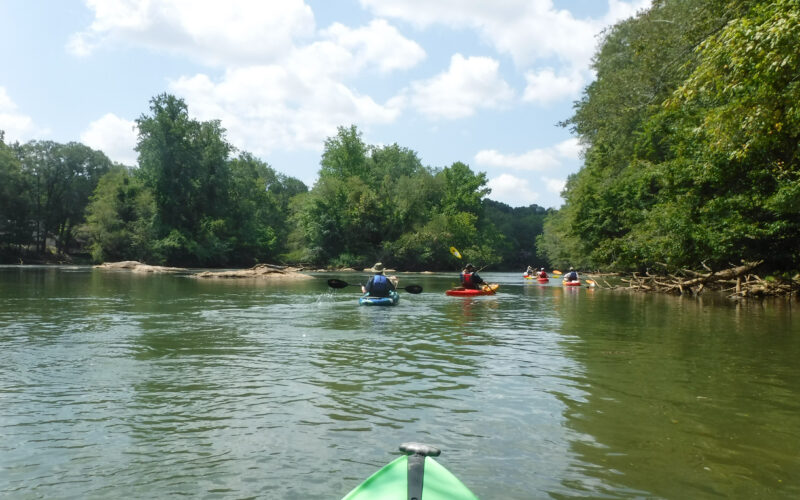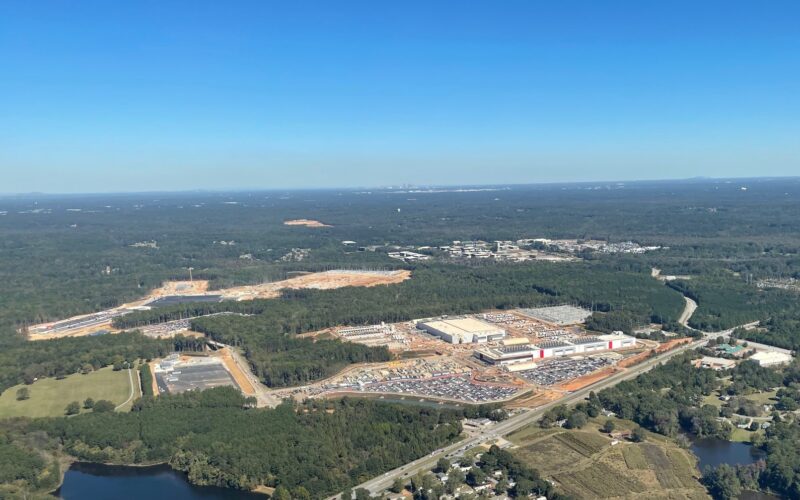Have you ever turned on the tap at the sink and not had water come out? It’s a true feeling of powerlessness. You might have the resources to make do without water for a few hours or a maybe even a day, but many people living in urban and rural parts of the Chattahoochee River basin have lived without water for much longer, sometimes years – until they found help.
Access to safe drinking water is not a given. In the state of Georgia, there are three programs that help qualified residents gain or sustain access to safe drinking water. A fourth program addresses lead contamination in drinking water in Georgia’s schools, helping to ensure that the water we do have access to is safe.
Chattahoochee Riverkeeper’s mission is to protect and preserve the Chattahoochee River for all who depend on it. As part of that goal, we want to ensure equitable access to safe drinking water for everyone, which is why we will discuss helpful water resources over a series of four blog posts. This is the third in the series.
A lack of access to clean and reliable drinking water in rural areas is an issue in many parts of the United States. Chattahoochee Riverkeeper investigated the scale and scope of this issue in Georgia, beginning in the Chattahoochee River basin and with a focus on groundwater drinking wells.
Rural Georgia depends on clean groundwater for economic and public health reasons. Of the more than 10 million people living in Georgia, the University of Georgia estimates that approximately 1.7 million people rely on 681,000 household water wells for drinking, cooking, and bathing. While this estimate represents approximately 10 percent of all Georgians, there is no centralized source of information or data on household groundwater drinking well quality or quantity; and there are limited regulatory measures in place to protect the quality of the well’s water source.
Chattahoochee Riverkeeper discussed household drinking water well issues with staff from the Golden Triangle Resource Conservation & Development Council, the 7 Rivers Resource Conservation & Development Council, and the University of Georgia Agriculture and Environmental Services Laboratory to learn about the scope of groundwater issues, what options homeowners have to investigate water quality issues within their wells, and how they can fix potential problems.
The Golden Triangle and 7 Rivers Resource Conservation & Development Councils (RC&Ds) implement the U.S. Department of Agriculture’s (USDA) Rural Decentralized Water Systems Grant Program. The RC&Ds receive grants from the USDA “to increase access to clean, reliable water and septic systems for households in eligible rural areas.” The RC&Ds use the grants to issue a 1% loan to qualifying low-income homeowners for the purpose of repairing or replacing damaged, contaminated, or non-functioning household drinking water wells.
Private drinking water wells in Georgia fail for different reasons. Shallow, bored groundwater wells dry up during drought, are compromised by surface water contaminated by bacteria, or are adjacent to industrial or agricultural wells that draw groundwater away from the private drinking water wells. Data from limited water quality monitoring indicates other contaminates have included arsenic, lead, radon, uranium, and nitrates. The RC&D loan program helps homeowners finance the drilling of deeper and more protected wells that cannot be easily contaminated by surface pollutants and are less like to be affected by adjacent well operations.
The USDA’s program can be implemented by any nonprofit or any of Georgia’s eleven RC&Ds, but only Golden Triangle and 7 Rivers currently participate. Both RC&Ds are located in South Georgia, a region of the state where the primary drinking water source is groundwater. Based on the national Water Well Trust organization’s limited operations in Georgia, there is evidence that homeowners in other parts of the state – including Murray County in the Ridge and Valley part of the state and many counties surrounding Macon on the Fall Line – would benefit from a statewide household water well program.
Georgia’s two RC&Ds have successfully operated household water well programs for more than a decade. But the RC&Ds can only replace a few wells every year due to a variety of factors. For example, there are limited numbers of qualified well drillers. In the southern part of the state, competent drillers are only available to drill for about eight to nine months of the year because they prioritize agricultural customers and wells during the ‘growing season.’ As a result, both RC&Ds have a waitlist of qualified homeowners seeking assistance. The RC&Ds each receive about 20 to 25 applications a year but can only serve about 10 homes a year. Some former and current applicants have been without safe and clean drinking water for more than a year. The RC&Ds are also limited by their own staffing capacity.
Since 2010, the two RC&Ds have collectively repaired or installed more than 280 wells. This includes approximately 25 household wells repaired or installed in four counties – Randolph, Clay, Early and Seminole – in the lower Chattahoochee River basin within the Golden Triangle’s service area. According to the RC&Ds, if they had additional resources and consistent access to qualified well drillers, then they could serve more household applicants.
When it comes to groundwater quality, there is no overarching regulating system or authority in Georgia that regularly checks the water quality of household water wells. The Georgia Water Well Standards Act (1985), as implemented by the Georgia Environmental Protection Division, “provides standards for the siting, construction, operation, maintenance, and abandonment of wells and boreholes to protect public health and water resources of the State.”
The Georgia Department of Public Health and the University of Georgia recommend following the “Six Principals of Wellhead Protection,” which is a checklist to ensure proper well location, proper well construction, prevention of contamination, sealing of abandoned wells, and regular water quality testing. These wellhead protection measures provide instructions to homeowners to help ensure that contaminants and pollutants do not enter a drinking water well. These principals include, for example maintaining the area around the well so that it is clean and accessible, diverting surface water away from the well, and ensuring that the upper terminal of the well has a sanitary seal or cover to prevent entrance of pollutants into the well. According to UGA, only 1.9 percent of the wells served by water lab have implemented all six principals. UGA has determined that there is a high correlation between wells missing at least one wellhead protection measure and coliform bacteria detected above satisfactory levels in the well’s water.
But a clear picture of groundwater quality and household wells is lacking. Since samples submitted to UGA are primarily submitted on a voluntary basis, there is a sampling bias because people who notice differences or issues with their water quality are more likely to submit a sample as opposed to those who are not experiencing any obvious water quality problems. The UGA extension laboratory has the ability to process more samples, and more samples would help enhance the quality of data on household groundwater and drinking water in Georgia.
Given Georgia’s lack of a comprehensive groundwater and household drinking water well regulatory system, individual property owners and household residents are ultimately responsible for testing their own well’s water quality. CRK recommends that households with a drinking water well who would like to test their water quality contact the University of Georgia’s local Extension Office. If you are aware of issues with a household well, UGA has also prepared a primer on how to monitor and resolve some water quality issues.



